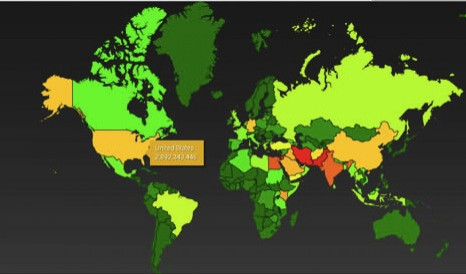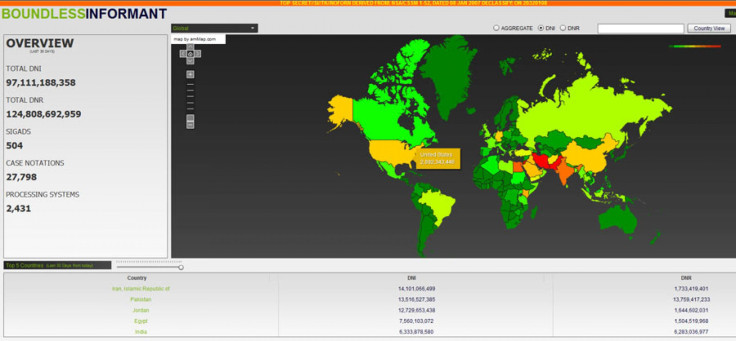Boundless Informant: NSA Data-Mining Tool Revealed In Latest Guardian Scoop

The U.S. National Security Agency’s veil of secrecy continues to be lifted ever higher by the U.K.-based Guardian. On Saturday, the daily newspaper revealed details of an NSA data-mining tool called Boundless Informant, which organizes and maps records of communications collected from computer and phone networks.

In one 30-day period ending in March, the NSA collected 97 billion pieces of intelligence from computer networks across the globe. A heat map obtained by the Guardian breaks down the data collection by country: In this period, more than 2 billion reports came from the U.S. -- a sizable number, but paling in comparison to Iran and Pakistan, with 14 billion and 13.5 billion reports, respectively.
A fact sheet about the Boundless Informant program acquired by the Guardian said, “[T]he tool allows users to select a country on a map and view the metadata volume and select details about the collections against that country.”
What proportion of that metadata is derived from specific wiretaps and which is part of broader programs such as PRISM is not yet clear. Nor is it clear what shape the PRISM program takes, or just how complicit technology giants such as Facebook Inc. (NASDAQ:FB) and Google Inc. (NASDAQ:GOOG) are in that program. On Saturday, the Guardian published a Microsoft PowerPoint slide from an NSA presentation that appears to indicate PRISM is mostly used to collect data from computer servers.
Boundless Informant does not reveal the content of emails or phone calls, but its data can encompass location and Internet Protocol address information, according to the Guardian.
“NSA has consistently reported -- including to Congress -- that we do not have the ability to determine with certainty the identity or location of all communicants within a given communication,” NSA representative Judith Emmel told the Guardian. “That remains the case.”
The Boundless Informant leak is just the latest published by the Guardian. The paper kicked off a frenzy this week when writer Glenn Greenwald revealed the existence of a secret court order that allows the government to collect data on phone calls placed by Verizon Communications Inc. (NYSE:VZ) customers both in the U.S. and between the U.S. and other countries. Based on the constant flow of its stories over the past few days, the Guardian’s well of information runs pretty deep.
© Copyright IBTimes 2024. All rights reserved.





















